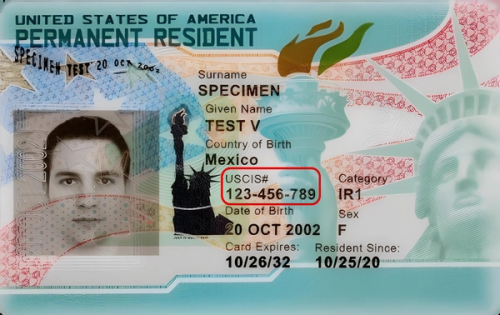Published: Nov 06, 2024|Updated or Revised for Accuracy: Sep 13, 2025
What is Alien Registration (A-Number), and Where Can You Find It?
The Complete 2025 Guide to Understanding and Locating Your A-Number
By Michal
An Alien Registration Number, or A-Number, is a unique identifier assigned to non-U.S. citizens residing in the United States. This comprehensive guide explains its importance in immigration procedures and provides step-by-step instructions on where to find your A-Number across various official documents.

If you're filling out any USCIS form or trying to check the status of your application, you may be asked about the A-Number, also known as the Alien Registration Number. Remember when I first filled out the I-765 form—it felt like I was being asked for an endless list of numbers, and I was completely overwhelmed. Each form seems to have unique requirements, and trying to keep track of everything can be challenging. For example, on the I-765, you're asked for your Alien Registration Number. But then there are also questions about your USCIS Online Account Number, I-94 Receipt Number, SEVIS, and even Social Security Number, even though you might not have some of them. And yes, you guessed it! Those are not the same numbers! It just adds complexity to already complicated forms. But don't worry! I'm here to help clarify these details for you, just like I wished someone had done for me back then.
What Exactly Is an Alien Registration Number?
Your Alien Registration Number (A‑Number) is the tracking ID the Department of Homeland Security stamps on every non‑U.S. citizen file.Picture it as your immigration Social Security number—meant to be one‑of‑a‑kind. Reality check: duplicate files, name changes, or system glitches can leave you holding two or even three A‑Numbers instead of one.
What are the different names of Alien Registration Number?
The most common names are Alien Registration Number and A-Number, though the USCIS glossary lists also:Alien Number and A#. I'm not sure why the USCIS# is not listed in the official glossary because this is how it is presented by various immigration documents (more about it below).
Why Is the Alien Registration Number Important?
The Alien Registration Number is more than just a random set of digits. It's essential for:
• Immigration Applications: Whether you're applying for a green card, work permit, or citizenship, you should provide your A-Number if USCIS has already issued you one.
• Tracking Cases: USCIS uses it to keep track of your immigration history and any applications or petitions you submit. Learn more how you can track your case status with USCIS.
• Communications: If you need to contact USCIS or other immigration authorities, referencing your A-Number ensures they can quickly access your records.
Where Can You Find Your Alien Registration Number?
Finding your Alien Registration Number can be like a treasure hunt, but it's straightforward once you know where to look. Here are some familiar places to find it:
1. Permanent Resident Card (Green Card): Your A-Number is located on the front side under "USCIS#."

2. Employment Authorization Document (EAD): Similar to the Green Card. Look for the number under "USCIS#".
3. USCIS Notices: Any official correspondence from USCIS often includes your A-Number at the top.
4. Immigrant Visa: It can be found on your visa stamp in your passport under "Registration Number." Note that nonimmigrant visas (such as (B-1, J, H-1B, etc.) will not have A-Number listed on them.
2025 FAQ on the Alien Registration Number
No, they are different. Your Alien Registration Number remains the same across all your immigration applications, while the USCIS Case Number is unique to each application or petition you file.
Most do, especially those who have applied for permanent residency or certain types of visas. However, like tourists, temporary visitors typically do not receive an A-Number.
Generally, your Alien Registration Number stays the same throughout your life. However, there are instances where USCIS issued new numbers for individuals who started new immigration processes.
Conclusion
Understanding your Alien Registration Number is a fundamental step in your U.S. immigration journey. It's not just a number; it's a key that unlocks various aspects of your life in the United States. By familiarizing yourself with where to find it and how to use it, you're setting yourself up for success.
Remember, you're not alone in this process. I've been there, and countless others have navigated the same path. Keep your head up, stay organized, and don't hesitate to reach out for help when you need it.
About Immiva
Resources
Disclaimer: Simple Immi LLC dba Immiva is not a lawyer or a law firm and does not engage in the practice of law, provide legal advice, or offer legal representation. The information, software, services, and comments on this site are for informational purposes only and address issues commonly encountered in immigration. They are not intended to be a substitute for professional legal advice. Immiva is not affiliated with or endorsed by the United States Citizenship and Immigration Services (USCIS) or any other government agency. Your use of this site is subject to our Terms of Use.
Copyright © 2025 immiva.com (Simple Immi LLC dba Immiva)